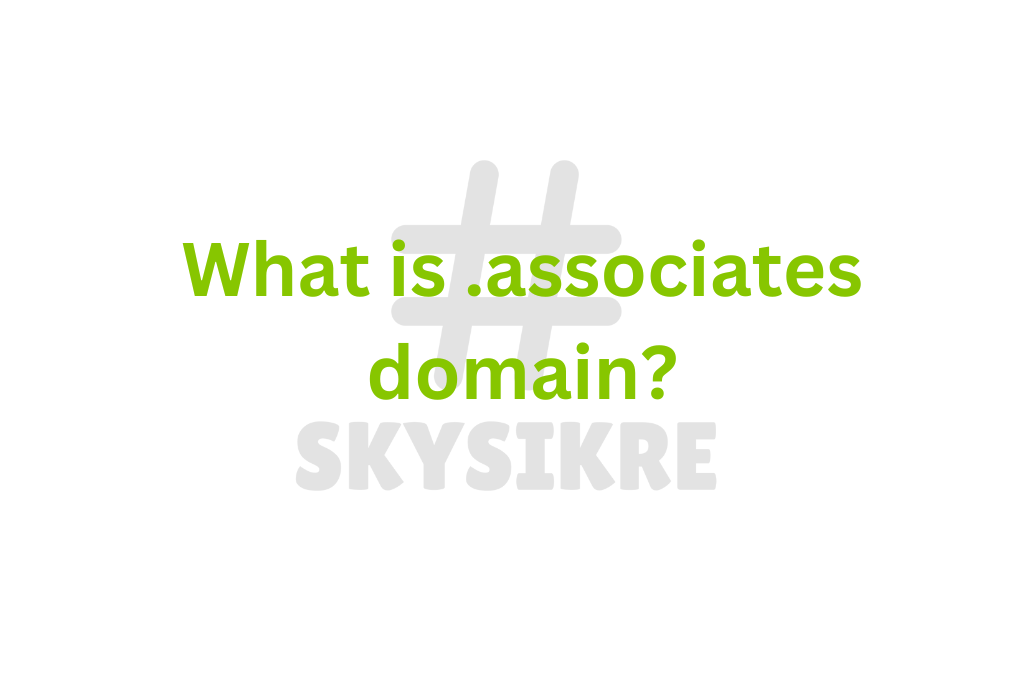Introduction to .associates Domain
The .associates domain is a notable top-level domain (TLD) that signifies a strong emphasis on collaboration, teamwork, and partnerships. As a relatively new addition to the vast array of domain names, it serves a specific purpose within the digital landscape. Domain names act as the address for websites, allowing users to navigate the internet effectively. Each TLD is designed to cater to particular categories or audiences, and the .associates extension is uniquely tailored to those entities that reflect partnership and joint ventures.
Primarily, the .associates domain is an ideal choice for businesses, organizations, and professionals whose focus revolves around alliances, associations, or cooperative projects. This makes it particularly appealing to various sectors, including consultancy firms, professional networks, and collaborative initiatives. The use of the .associates domain underscores the collaborative nature of these entities, making it clear to users that the associated website is rooted in partnership and teamwork.
In a crowded digital space, the choice of domain can significantly influence how a brand is perceived. By adopting the .associates domain, businesses can foster an image of cooperation and mutual support, appealing to a target audience that values collaboration over competition. Importantly, the .associates extension serves not only as a distinctive identifier but also as a strategic branding tool. This can enhance outreach and engagement with stakeholders who are inclined towards collaborative efforts and partnership-driven models.
Overall, understanding what is the .associates domain allows organizations to position themselves effectively within their markets, creating a sense of community and emphasis on shared goals. The .associates domain is much more than just a website address; it reflects a commitment to partnership and collaboration among its users.
History and Evolution of Domain Names
The history of domain names traces back to the early 1980s, a period marked by the growing need for an organized addressing system on the expanding internet. The initial establishment of the Domain Name System (DNS) facilitated the transition from numeric IP addresses to more user-friendly domain names. This shift not only simplified navigation but also fostered the rapid growth of websites and online services.
Initially, domain names were limited to a handful of generic top-level domains (gTLDs) such as .com, .org, and .net. These extensions served specific purposes, with .com primarily catering to commercial entities, while .org was designated for non-profit organizations. Over time, the Internet Corporation for Assigned Names and Numbers (ICANN) recognized the importance of expanding the selection of domain extensions to accommodate a myriad of organizations and interests. This led to the introduction of a multitude of niche TLDs, which includes the .associates domain.
The emergence of niche top-level domains reflects the growing complexity of the online landscape and the diverse needs of internet users. The .associates domain, for example, was created to facilitate the recognition of partnerships and professional collaborations, making it particularly appealing to firms, businesses, and professional networks. By providing a distinct identity, the .associates domain helps organizations to better convey their intentions and establish credibility in their respective fields.
As a result of this evolution, the current DNS hierarchy encompasses a vast array of TLDs, enabling individuals and organizations to select domain extensions that align with their missions and branding strategies. The rise of specialized domains like .associates signifies a broader acceptance of diverse online identities, catering to the unique characteristics and preferences of various entities in the digital ecosystem.
Who Can Register a .associates Domain?
The .associates domain extension is designed for a variety of entities, especially those that emphasize collaboration, partnership, and teamwork. This domain can be beneficial for businesses, organizations, and individuals who operate within specific sectors, such as consulting, legal services, or any professional realm that values associate relationships. As a general rule, any group looking to demonstrate their association with others in a professional context may consider registering a .associates domain.
Partnerships and alliances, both formal and informal, hold a significant place in the modern business ecosystem. Therefore, companies formed as partnerships can take advantage of the .associates domain to showcase their collaborative strength. For instance, legal firms often have multiple associates working together; a .associates domain can thus reflect their interconnected services. Additionally, consulting firms that collaborate with various clientele may find this domain extension particularly advantageous for branding purposes.
Moreover, non-profit organizations and community associations that thrive on collective efforts are also prime candidates for a .associates domain. This domain extension can capture the essence of their mission, signifying a shared commitment among different members or organizations. Individuals who showcase their expertise and connect with others in their industry can also benefit from the .associates domain, allowing them to create a more professional image and network effectively.
In essence, if an entity’s operations focus on association and collaboration, they are likely a suitable candidate for a .associates domain. The domain’s flexibility allows for diverse use cases, from professional networking to business partnerships, making it a strategic choice for those seeking to represent their associations online. Overall, the .associates domain is reflective of collaborative undertakings, making it an ideal choice for a wide spectrum of registrants.
Benefits of Choosing a .associates Domain
The decision to use a .associates domain can significantly influence an organization’s branding and online presence. One of the primary advantages of selecting a .associates domain is the opportunity it provides for unique branding. Unlike more common domain extensions like .com or .net, the .associates extension allows businesses to distinguish themselves within their industry, creating a distinctive identity that resonates with their audience. This uniqueness is particularly beneficial for partnerships, collaboration-oriented ventures, and professional services.
Furthermore, a .associates domain enhances credibility for businesses. When potential clients or partners encounter a .associates domain, it communicates a sense of professionalism and specialization. This is especially critical for firms that operate within the consulting, legal, or medical sectors, where trust and credibility are paramount. As customers increasingly expect businesses to have dedicated domain names that reflect their services, utilizing a .associates domain can enhance perceived legitimacy and authority within the marketplace.
In terms of online visibility, a .associates domain can also improve search engine optimization (SEO) outcomes. Search engines often use domain extensions as a factor in their ranking algorithms, therefore, having a relevant extension like .associates can help businesses cater to a specific audience. This specificity can facilitate better targeting of potential clients who are searching for partners or collaborators, thus improving overall traffic and engagement on their websites.
Finally, adopting a .associates domain signifies a commitment to collaboration and partnership. This aspect is appealing for businesses aiming to build networks and foster relationships with other entities in their field. Through this domain choice, organizations can effectively align their online presence with their mission and values, creating a cohesive narrative that attracts like-minded individuals and companies.
How to Register a .associates Domain Name
Registering a .associates domain name can be a straightforward process when approached methodically. The first step in this journey is selecting an appropriate domain name that encapsulates your brand or the purpose of your website. It is advisable to keep the name concise, memorable, and relevant to your business or personal interests. Avoid using complex terms or excessive hyphens, as simplicity often enhances user recall.
Once you have decided on a suitable domain name, the next step involves choosing a registered domain name registrar. Various registrars offer different pricing models and customer service standards. It is crucial to select a registrar that is accredited through the Internet Corporation for Assigned Names and Numbers (ICANN) for optimal security and reliability. Some of the well-known registrars include GoDaddy, Namecheap, and Bluehost, among others. Consider comparing reviews and features such as DNS management, email services, and customer assistance.
After selecting your registrar, the following step entails checking the availability of your desired .associates domain name. This can typically be accomplished through the registrar’s search tool. If your chosen name is available, proceed by adding it to your cart. Should the domain be taken, many registrars will suggest alternative domain names or variations that could still align with your brand.
Upon confirming the availability, you will need to provide the necessary personal information, including your name, address, email, and phone number. Following this, review the terms of service and privacy options, particularly regarding domain registration privacy. Finally, complete the payment process to finalize your domain registration.
In conclusion, registering a .associates domain name is an achievable endeavor when you carefully select a name, choose a reliable registrar, and follow the correct procedures. By doing so, you establish a vital online presence for your brand or initiative.
Best Practices for Using a .associates Domain
Utilizing a .associates domain effectively requires a strategic approach tailored to your branding and online presence. The first step in this process is ensuring your website development aligns with modern standards. This involves selecting a responsive design that offers an optimal user experience across all devices. A well-structured website not only attracts visitors but also encourages them to engage with your content. Prioritizing fast loading times and intuitive navigation can significantly enhance the overall user experience, making your website more appealing and accessible.
Branding strategies play a crucial role when launching a .associates domain. It’s essential to create a consistent brand identity that resonates with your target audience. Incorporate your domain in all marketing materials, including social media profiles, business cards, and email signatures to reinforce brand recognition. Additionally, focus on content that reflects your core values and expertise, which in turn establishes your credibility in your field. A cohesive and polished brand image can help differentiate your website from competitors.
Search Engine Optimization (SEO) practices are also vital when using a .associates domain. Optimize on-page elements by including relevant keywords in your titles, headings, and throughout your content. Content should be informative and relevant to your audience, promoting higher engagement rates. Furthermore, consider implementing a backlink strategy to enhance your site’s authority and visibility in search engine rankings. Pay attention to local SEO efforts if applicable, as this can help you reach audiences seeking local services.
Finally, it’s important to be aware of common pitfalls. Many assume that simply having a .associates domain will automatically bring traffic. However, without a robust marketing strategy and ongoing SEO efforts, the potential of the domain may go underutilized. Ensure you regularly review performance metrics and adjust your strategies accordingly to achieve the desired results.
Common Misconceptions About .associates Domains
Despite the growing popularity of the .associates domain, several misconceptions hinder its widespread acceptance among businesses and individuals. One prevalent myth suggests that .associates domains are only suitable for legal or formal associations, limiting their use to specific professional settings. In reality, this domain extension is versatile and can serve a variety of industries, including technology, non-profits, and consultancy firms. Organizations seeking to build collaborative networks can significantly benefit from the .associates domain, as it emphasizes partnership and cooperative work.
Another common fallacy is that .associates domains lack credibility compared to traditional domain extensions such as .com or .org. However, the effectiveness and reputation of a domain ultimately depend on the content and functionality of the associated website rather than the extension itself. A well-structured platform using a .associates domain can convey professionalism and dedication to teamwork, thereby competing effectively in the online landscape. It’s instances like these that can transform perceptions around newer domain options, demonstrating that innovation does not compromise quality.
Moreover, some individuals falsely believe that utilizing a .associates domain will negatively impact their website’s search engine optimization (SEO) potential. This misconception arises from the idea that established domain extensions carry more weight with search engines. However, search engines prioritize content relevance, site structure, and user experience over the domain extension. Therefore, a .associates domain can rank just as effectively as traditional domains when optimized correctly. Understanding these aspects is crucial for businesses exploring new ways to establish their online presence.
Future of .associates Domains
The .associates domain is poised for an evolution in the digital landscape as businesses and organizations increasingly recognize the benefits of this specific top-level domain (TLD). In an era where online presence can dictate the success of a business, the potential growth of .associates domains is particularly significant. This trend reflects a broader shift towards more descriptive and meaningful domain names that can enhance brand identity and convey professional relationships.
As more startups and established firms seek to differentiate themselves in a crowded marketplace, the .associates domain offers an attractive option for showcasing collaboration and partnership. This TLD is particularly suitable for companies that prioritize teamwork, consultancy services, or professional networks. With the increasing importance of work relationships in today’s economy, it is likely that demand for .associates domains will continue to rise, driven by businesses eager to convey their collaborative ethos.
User perception is also expected to evolve as digital users become more informed about the significance of domain names. Factors influencing this perception may include enhanced awareness of the advantages associated with specific TLDs, such as authenticity and professionalism. As consumers develop preferences for businesses that take their online branding seriously, the .associates domain could become a sought-after choice that signals solidity in partnerships and collaborative efforts.
Moreover, technological advancements will play a crucial role in shaping the future usage of .associates domains. This could involve innovations in web hosting, search engine optimization, and online marketing strategies that specifically highlight the value of using a domain that emphasizes association. As these technologies evolve, they will likely broaden the appeal and accessibility of .associates domains across various sectors.
In conclusion, the future of .associates domains appears promising, characterized by growth, changing perceptions, and technological support that will enhance their relevance in the online marketplace.
Conclusion: Is a .associates Domain Right for You?
As we have explored the numerous advantages and specific characteristics of the .associates domain, it is clear that this unique online space can play a pivotal role in digital branding. A .associates domain primarily caters to partnerships, collaborations, and professional networks, serving as a powerful tool for entities that emphasize teamwork and collective expertise. Businesses and individuals alike should assess their needs and audience to determine if this domain aligns with their branding strategies.
For businesses that operate in specialized fields or those that heavily rely on affiliates and distribution networks, a .associates domain can elevate the perception of professionalism and collaboration. This extension does not just represent a website; it encapsulates a commitment to working together harmoniously. If your brand’s identity thrives on partnerships or if you are part of a collective of professionals, adopting a .associates domain may significantly enhance your digital presence.
Moreover, the distinctiveness of the .associates domain helps differentiate your brand from competitors utilizing more conventional domain extensions. This can foster stronger recognition and credibility within your industry. However, companies feeling unsure about this choice should also consider their target audience’s familiarity with alternative domains. Are your customers aware of the .associates extension, or would they expect a more traditional option? Evaluating these aspects is crucial for aligning your digital strategy with user expectations.
Ultimately, the decision to adopt a .associates domain depends on a careful consideration of your business objectives, target market, and branding aspirations. By reflecting on these critical factors, you will be better positioned to determine if the .associates domain is indeed the right fit for you, paving the way for future growth and online visibility.






